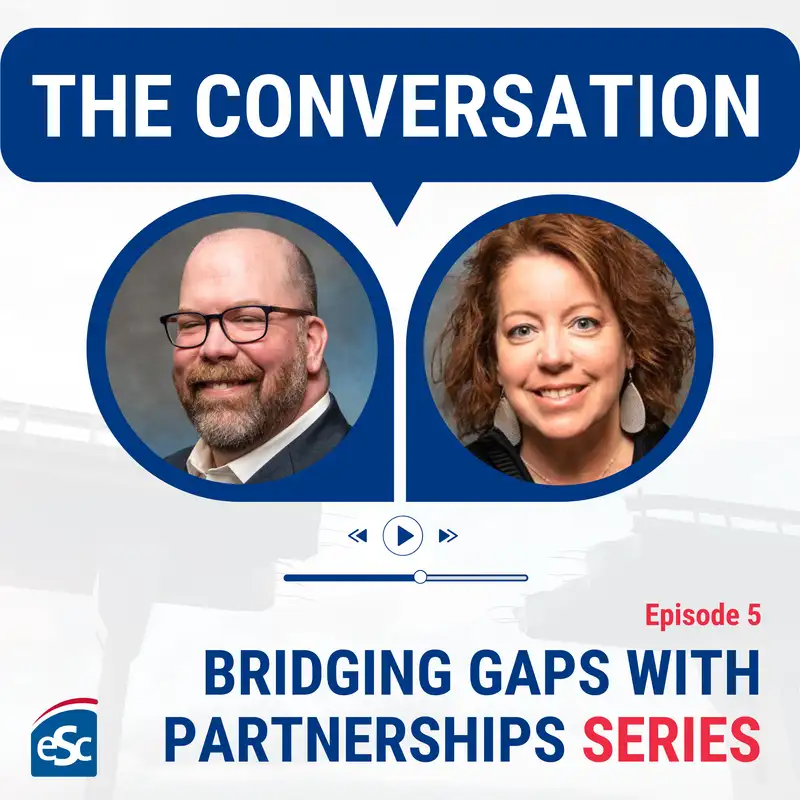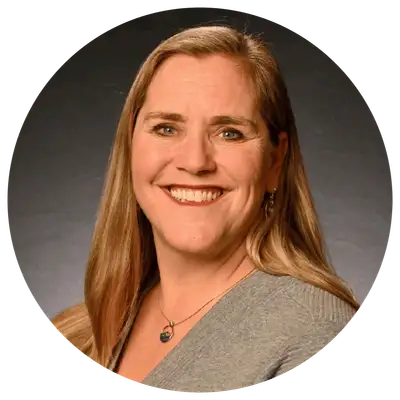
Partnering with Metro Parks
Jill Snyder: And it could be things like a night hike or a fishing program or a nature hike, things like that. In the wintertime, we do a lot of indoor craft programs, and then we offer a ton of school programming.
Speaker 2: That was Jill Snyder, the Visitor Engagement Manager and Public Information Officer at Columbus and Franklin County Metro Parks. On this episode of The Conversation, John and Rachel explore the exciting array of current park activities, discuss upcoming events, and learn about a new facility designed with accessibility and inclusivity in mind. Let's dive in.
John Hambrick: Hello and welcome back to The Conversation, Ohio voices in education, igniting ideas, inspiring change. So glad you're back with us. And alongside me here on our Conversation podcast, my esteemed colleague, Rachel Daniels. Rachel, so glad you're here with us. And as we sit for this podcast today, we're on the move. Man, I got to tell you, we are really in action today,.and to help us with that and our great partnership, we have Jill Snyder, Jill's our Visitor engagement manager and public information manager of our Metro Parks.
Jill, welcome to the conversation.
Jill Snyder: Thanks for having me.
John Hambrick: Heck yeah. Hey, for the benefit of our listeners, could you share with us just a bit about yourself and how you got connected with our Metro Parks?
Jill Snyder: Yeah, I grew up in the Cincinnati area, so not here in Columbus, and I loved being outside. So when I was looking for career options, trying to figure out what I wanted to do when I grew up, I discovered that I could be an educator, but an educator of all things outdoors. And so when I moved to the Columbus area, I started working for Metro Parks as what we call a naturalist. So I get to go outside, lead hikes, lead walks, that sort of thing, and it was fabulous. We did school programs, all of that. As I grew, eventually I ended up in administration as it often happens. And so now I oversee our education and programming and events. I also then do the marketing, public media, public information sorts of things. And then I also book reservations of our Reservable facilities. So a little bit of everything that any visitor might want to know about or learn about from the Metro Parks. That's what I do for them.
John Hambrick: Outstanding. And our listenership is pretty broad across the region and across the state. Can you share specifically about the Metro parks and really the layout and how accessible our parks are?
Jill Snyder: Yeah. Again, I grew up in the Cincinnati area, so I grew up going to, at the time they were called Hamilton County Parks. Now they're great parks of Hamilton County, but I used all of the parks. And all of the parks, whether it's a smaller local park, the Columbus City Parks or the state parks, the national parks, the Metro Parks, overall, the goal is always conservation preservation. I like to think of it like a school district. A school district is all about teaching kids, but how you go about doing that changes a little bit from district to district based on your administration.
So for us, the Columbus and Franklin County Metro Parks is our official name, we serve Franklin County primarily, but we actually have parks in the six surrounding counties as well. We have 20 parks total in our system. And in those 20 parks, we have over 28,000 acres of land. So we're fairly large park district, 230 miles of trails. I usually tell folks, if you're thinking you've pulled into a park and it's got a great parking area, restrooms, shelter house, and gorgeous trails, it's probably a metro park. If you pull in and you see a lot of soccer fields, it's not us. We are much more about what we like to say, passive recreation. So getting out and really enjoying nature and the natural world. And of course we've got facilities and things like that, but it's more to us about the nature components of things.
Rachel Daniels: I am a learner, a lifelong learner. I love learning new things, and I just learned a new phrase from you that I've never heard of or used before, and that is the idea of passive recreation. I'm going to incorporate that into my lingo because I feel like that's just a great way to talk about taking a nice walk at the park. So speaking of learning and the parks, can you talk to us about the educational programming that the Metro Park offers? I've heard that there are great opportunities for partnerships, so we'd love for our listening audience to hear about some of those available opportunities.
Jill Snyder: Yeah. We often break our education down into a couple of different buckets. I talk about public programming. Public is stuff that anybody can come to, whether it's a family, an individual. Sometimes it's for target audiences, adults over 50 or preschool age kids, and those are open to anybody. One of the great things about Metro Parks is that all of what we do, with the exception of reserving facilities, is free. So we advertise our public programs on our website and through social media, and it could be things like a night hike or a fishing program or a nature hike, things like that. In the winter time, we do a lot of indoor craft programs.
And then we offer a ton of school programming, and school programming is, it's a general term that I use. You don't necessarily have to be informal education. It can be a youth group, a Girl Scout troop, things like that, but those are more scheduled opportunities. So you can reach out to us in the metro parks and we will schedule a program for your group. We usually try to make sure that we're hitting whatever your curriculum needs are. So if you're studying ecosystems or food webs, we can do a program with our education animals to show you a frog and a snake and talk about what they eat. It could be a guided hike where the naturalist shows you the different ecosystems that are there.
For those sorts of school programs where you come to the parks, those field trips, we schedule them really year-round. Not a lot of people take us up on a December or January walk, but we can. We usually try to get about 15 kids at a minimum, up to 120. So we'll get some schools that all of the fourth graders come out to learn about the geology of a park and they rotate through different stations and activities.
We do offer off-site programs, so we can come to the schools. We usually try to do that this time of year when less people are excited about coming out to the park, and so we just bring that program with us to the school or to the location. And those programs, again, we try to focus on hitting the needs of the students and whatever they're learning. So if there's a target age or a specific subject, our staff is pretty good at meeting, working with the teachers to get the right things out there.
Rachel Daniels: So it sounds like there are so many different opportunities, and I love that you highlighted that it's not just for formal educational groups that the Metro Parks has programming available, that there's a wide swath of opportunities for folks. So thanks for being specific about that.
Jill Snyder: Yeah, and we do have... Obviously we're used to a lot of schools coming to us, but we get a lot of groups, especially nowadays that are homeschooling consortium of families or again, a youth group. And we've gotten more and more requests now from adult learning groups. Maybe it's a senior center, but it could also be a women's hiking club that gets together. Usually for our group programming, we try to do that in the weekdays and leave the weekends for our public programs, but you can also bring a group of kids to the public program. So if you've got a scout group that meets every Saturday morning and they want to come out to a public program, we're happy to have them.
And I should mention, we also have nature centers at a few of our parks. So I mentioned that we have 20 different parks. We have four nature centers, and those are open year-round. During the summertime they're open from 9:00 AM to 8:00 PM. This time of year, it's 9:00 AM to 6:00 PM, but it's a great place to bring kids and adults to learn. There's almost always education animals that you can see. There's information about Ohio wildlife, about, again, different ecosystems, ways that you can get involved and help in the natural world. And so if you're thinking like, "Oh, man, it's really cold outside and I don't really want to be out in the metro parks," you can take a hike. I always say I just wear more clothes. I just dress in layers and hike faster to warm up. But then you can also come into the nature center afterwards to warm up, learn a little bit, experience some other things. And there's staff in there that will answer questions. So if you're out on a hike by yourself and you're like, "Man, I really wonder what that bird was, the staff in the Nature Centers can answer those questions too."
John Hambrick: I think it's been pretty cool that we've talked or predominantly about the two legged visitors. I've got a couple of large breed dogs and the metro parks are very welcoming to our canine friends as well.
Jill Snyder: Yeah, especially times have changed. It used to be that you weren't allowed to bring your dogs to most of the parks, and now we have a pet friendly trail in all of our parks, and some of our parks, almost every trail is pet friendly. You can find that information on our website, so if you want to try and plan before you come out. And then we also have dog parks, like the off leash areas. If your dog needs to really run and you don't want to run with them, it's a good spot to check out.
John Hambrick: They've been very accommodating for sure. You've given a great overview of how people can access a variety of different programming through the Metro Parks. So that's what's happening today. Can you share what's coming down the pike? You guys are always evolving and I'm sure our listeners would appreciate hearing what's next.
Jill Snyder: Yeah, we have two new parks that are going to come online hopefully in the next year or so. They're both on the south end of Columbus to try and make more connections. One of them is Great Southern. That's near 270 and 23. And then the other one is Bank Run, which is in the Obetz area. So those are going to be new Metro Parks, trying to serve some more communities that maybe don't have as much access to the parks or just to get us closer to other people.
And the thing that is definitely happening is this spring we're going to open an accessible playground. It is inclusive in that it's got a fence all around it so that it helps contain any kiddos that might be tempted to wander or stray. And it's very wheelchair friendly, so you can actually wheel up into the play structure. It's got a merry-go-round that is wheelchair accessible. You can just be in your chair. It has a zip line that has a harness to it. So if you've got mobility challenges, you can get in there. It's got a sensory area. It's got communication boards. It's going to have a universal changing table in the restroom. So we are really looking at it as being a fully accessible space. And we're going to change the way we do it a little bit in that it's going to be open for those with special needs first and foremost, and then it will be open to typical abilities secondary.
So we're really excited to be able to offer that. Hopefully March is... We're doing some pilot programs now to test it, make sure that everything's good to go, and then by warmer weather, we should be ready for that to happen.
John Hambrick: In our education jargon, for those kiddos that like to run, we call them elopers. So you've fenced in our elopers. So mom's, parents and friends will appreciate that.
Jill Snyder: Yeah. Well, and we actually, we put in a gate that is somewhat similar to what we would use in our dog parks. It's like a dual gate system, partly because we understand that those kiddos that do wander can open a gate, and this way, there's at least a little bit of a stop gap for those adults or caregivers to get close enough to stop that from happening.
Rachel Daniels: Well, as our conversation begins to come to an end, what I'm excited about our listeners hearing are just the fast opportunities that the park offers to all groups in education. John just talked about our elopers, but another thing we really believe is presumed competence and this idea that all students, all people should have access and opportunity, and the parks are doing such a good job of exemplifying that. So how exciting it is to hear about this new endeavor.
For those folks who are listening, if they're anything like me, right now, they're feeling pretty inspired. So can you talk about ways that people in the community outside of the programming that you talked about? What are other ways folks can get involved? Or you mentioned planning a walking route with a dog in advance. Talk about how folks can figure out what the various parks offer so they can figure out that plan to get connected.
Jill Snyder: Yeah. I say this all the time, but our website has everything you could ever want to know about the Metro Parks. It is www.metroparks.net. There's lots of park districts out there. So we're the metroparks.net. And then, if you look on that website, you will be able to find a list of trails. You will find a list of those programs. You'll find the contact information for the parks. So if you wanted to schedule a school field trip or a visit, you can see that on there. And then we have a section about getting involved. And so under that get involved tab, you can find out about whether it be donating to our friends of Metro Parks, our philanthropic arm, or how can you be a volunteer. Those sorts of things are all on there. We have lots of what we call typical year-round volunteers, but then we have a group that might want to come out just once or they need some service hours. All the contact information for that is on our website.
Rachel Daniels: That's great. I think John and I are both inspired and we want to tell you our favorite parks. So I'll start and say I absolutely love the Scioto Grove Metro Park. It's closer to me, but I am really excited to talk to you a little bit more offline to hear about the other park that's going to be in my neck of the woods you mentioned. The thing I love about the park is the proximity to the water. I love to just walk down by the water, and that's one of our favorite things to do. So John, what's your favorite?
John Hambrick: I'm just saying, if the Metro Parks had merch, I would sport a t-shirt that says I walk Walnut Woods Tall Pines all day long. So heck yeah. We need more merch.
Jill Snyder: Well, we have a Friends of Metro Parks, which is, like I said, our philanthropic arm. One of the things that they're going to kick off, and maybe I'm going to give away too much, but in probably 2026, they are going to look at what we're calling your home park. So we do a lot of go to every park, see every trail, but we realize that there are people that have favorites and we want to honor that a little bit. And so we want to create this, "John's favorite park is Walnut Woods. Rachel's favorite park is Scioto Grove. Jill's favorite park is Battelle Darby Creek," and let us get some of that merch and then maybe make it into a friendly competition to see which park can get the most people in love with them. So coming down the line, couple years, but we might have a shirt for you, John.
John Hambrick: That would be amazing. And our friends at Experience Columbus, they had the coffee trail ending with a t-shirt. They had the local breweries ending in a t-shirt, stamping passports. Yes, I would sport that t-shirt on a regular.
Jill Snyder: Perfect.
Rachel Daniels: Well, gosh, Jill, time has just flown by. And again, you have inspired both John and I. have a feeling we're both going to put on our walking shoes and head out yet tonight to get a few steps in one of our favorite places. So we thank you so much for joining us today and teaching our audience a little bit more about what the Metro Parks can offer.
Listeners, you can check the podcast notes for resources to share, and don't hesitate to check out the Metro Parks website to get more information. For John, this is Rachel, stay curious and keep the conversation going.
Creators and Guests


